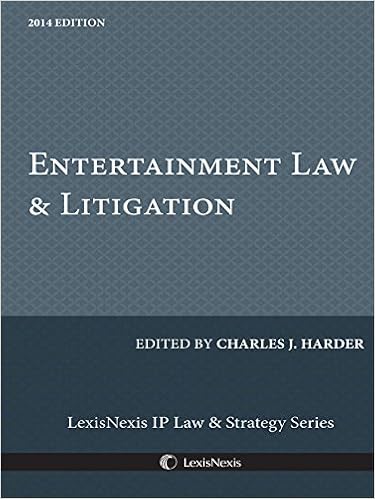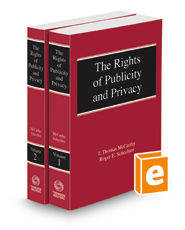What are Personality Rights?
"Personality rights" generally refers to two types of tort-based rights: the right to privacy and the right of publicity.
The Right to Privacy
The principle which protects personal writings and any other productions of the intellect or of the emotions, is the right to privacy, and the law has no new principle to formulate when it extends this protection to the personal appearance, says, acts, and to personal relation, domestic or otherwise.
Samuel D. Warren & Louis D. Brandeis, The Right to Privacy, 4 Harv. L. Rev. 193, 213 (1890).
That is:
- The right not to have one's personal matters disclosed or publicized; the right to be left alone.
- The right against undue government intrusion into fundamental personal issues and decisions.
The right of privacy encompasses four different interests, which map to four distinct types of invasion of privacy:
- Intrusion
An encroachment into plaintiff’s physical solitude or seclusion.- Public Disclosure of Private Facts
The disclosure of private information, even though the information is true, in a way a reasonable person would find objectionable, e.g., disclosing the past of a former prostitute.- False Light
The publication of information that places plaintiff in a false light, e.g., using a person’s picture in connection with an article in which no reasonable connection exists; nonetheless, with an implication that such a connection exists.- Appropriation
Use of the plaintiff’s name or likeness for defendant’s benefit without permission.
William L. Prosser, Privacy, 48 Calif. L. Rev. 383 (1960).
There is significant overlap within the definitions of appropriation and the right of publicity.
The Right of Publicity
Generally, the right of publicity prevents the unauthorized commercial use of an individual's name, likeness, or other recognizable aspects of one's persona. It gives an individual the exclusive right to license the use of their identity for commercial promotion. The right of publicity is often divided into five separate interests:
- Performance
One’s prerogative to exclusively perform services through which the individual earns a living. - Adaptation
One’s prerogative to exclusively authorize others to create derivative works personifying the person’s performance either as done by the person or others. - Personality Products
The exclusive exploitation of products based on a person’s name, likeness or image, e.g., posters, motion pictures, stills from motion pictures and even bubblegum cards. - Endorsement
The use of person’s name, likeness, image and reputation in connection with the advertising of goods or services. - Reputation
The protection of one’s reputation against misuse even though the use was otherwise authorized. This right embodies the appreciation that an artist’s past performance has a continuing effect on the artist’s future works.
For a concise history, see Right of Publicity.com.
Primary Law
The Constitution
Neither the Right of Publicity nor the Right to Privacy are explicitly mentioned by the U.S. Constitution, although the Right to Privacy has been held to be inherent within the Fourteenth Amendment, see Meyer v. Nebraska (1923) and Pierce v. Society of Sisters (1925), and penumbras of the First, Third, Fourth, Fifth, and Ninth Amendments, see Griswold v. Connecticut (1965).
Statutes
In Ohio, the right of publicity is governed by statute O.R.C. § 2741, which states:
[A] person shall not use any aspect of an individual's persona for a commercial purpose:
- During the individual's lifetime;
- For a period of sixty years after the date of the individual's death; or
- For a period of ten years after the date of death of a deceased member of the Ohio national guard or the armed forces of the United States.
The statute grants this limited right to Ohio residents (O.R.C § 2741.03), and may be freely transferable and descendible by contract, license, gift, trust, will, or the laws of intestate succession (O.R.C § 2741.04).
For a state-by-state map, see Right of Publicity.com.
Cases
Privacy
- Solitude
- Shulman v. Group W Productions
- Jackson v. Playboy
- Gritzke v. MRA Holding
- Private Facts
- Cox Broadcating v. Cohn
- Ross v. Midwest Communications
- False Light
- Time v. Hill
- Cantrell v. Forest City Publishing
- Spahn v. Julian Messner
- Dresbach v. Doubleday & Co.
- Street v. National Broadcasting
Publicity
- O’Brien v. Pabst
- Haelan Labratories v. Topps Chewing Gum
- MLK Center for Social Change v. American Heritage Products
- Parker v. LaFace Records
- ETW v. Jirch Publishing
- Zacchini v. Scripps-Howard Broadcasting
- Estate of Presley v. Russen
- Matthews v. Wozencraft
- Hicks v. Casablanca Records
- Polydoros v. Twentieth Century Fox
- Carson v. Here's Johnny Portable Toilets, Inc.
- Vanna White v. Samsung
- Comedy III Productions v. Gary Saderup
For more notable cases, see Right of Publicity.com.
Secondary Sources
-
 Entertainment Law & Litigation
by
Publication Date: 2013-Chapter 2 Right of Publicity
Entertainment Law & Litigation
by
Publication Date: 2013-Chapter 2 Right of Publicity
Chapter 11 Invasion of Privacy, Stalking and Harassment -
 Intellectual Property, Unfair Competition and Publicity
by
ISBN: 9780857932624Publication Date: 2014
Intellectual Property, Unfair Competition and Publicity
by
ISBN: 9780857932624Publication Date: 2014 -
Overlapping Intellectual Property Rights by
Call Number: K1401.O93ISBN: 9780199696444Publication Date: 2012 -
 Privacy and Publicity
by
Publication Date: 1990
Privacy and Publicity
by
Publication Date: 1990 -
 lessons and tutorials:
lessons and tutorials:
-
Getting The Deal Through, Right of Publicity byPublication Date: 2020
-
-
-
Representing the Professional Athlete by
Call Number: KF3989.C37ISBN: 9781634597036Publication Date: 2018
-
Secondary Sources: Art & Entertainment & Sports LawUnder Topic you may also want to select Torts & Personal Injury.
-
Legal Resource Index (LRI)A controlled-vocabulary index of legal literature with a focus that includes legal newspapers, bar journals, and other practice-oriented material. LRI coverage generally begins in 1980, with a later starting date for certain individual publications. Click the icon of the database you prefer to link to the Index.
-
EBSCO Legal CollectionCollection of about 250 law journals, including a mix of law-school based journals, peer-reviewed journals, bar journals, and other genres of legal literature.
-
EBSCO Academic Search CompleteA multi-disciplinary full-text database that indexes and abstracts over 10,000 publications, some law-related. Includes the full-text of over 5,400 periodicals, including more than 4,400 peer-reviewed journals.
-
Index to Legal Periodicals and Books (ILP)This is the premier index of legal periodicals, books, and sympoisa, with a primary focus on English language resources. Many articles are available in full-text. Some articles may be available via HeinOnline.
 &
& 

